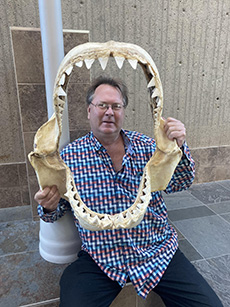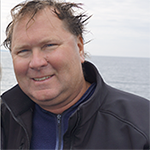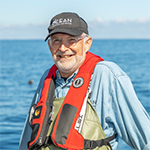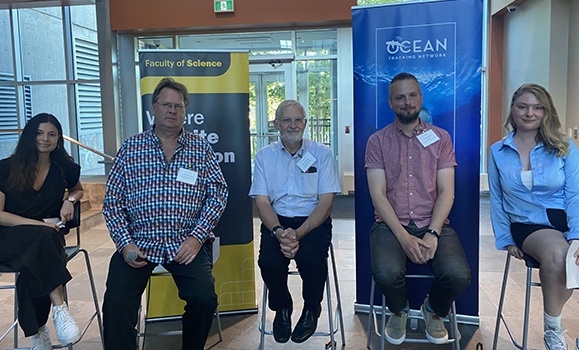As summer arrives, the warm temperatures bring new visitors to Nova Scotian waters. According to Dr. Chris Harvey-Clark, director of animal care and university veterinarian at Dalhousie, “Sharks are here four weeks earlier than last year.”
 Warming waters due to climate change was one of many topics discussed at a recent event that brought together a group of şÚÁĎłÔąĎÍřscientists to share their knowledge, understanding and passion for shark research and conservation.
Warming waters due to climate change was one of many topics discussed at a recent event that brought together a group of şÚÁĎłÔąĎÍřscientists to share their knowledge, understanding and passion for shark research and conservation.
Shown left: Dr. Chris Harvey-Clark shows off the jaw bones of a white shark.
More than 100 people gathered in the atrium of the Steele Ocean Sciences Building for the ocean-themed discussion hosted by Dalhousie’s Faculty of Science.Ěý
The panel included Dr. Chris Harvey Clark, director of animal care and university veterinarian at Dalhousie, Dr. Fred Whoriskey, executive director of the Ocean Tracking Network, Dr. Manuel Dureuil (PhD’19), president at the Shark and Ray Conservation Centre and Kirsti Burnett (BSc’15), director and researcher at the Shark and Ray Conservation Centre. Marine biology student Vanessa Schiliro,Ěýwho gained media attention last year for her expertise in shark safety, moderated the event.
The panellists shared how their research is impacting shark conservation on a global scale.
 “I’m passionate about shark behaviour and the social dimensions of shark conservation. Last year, I provided tips for divers, surfers and swimmers to co-exist with white sharks peacefully,” says Schiliro, who is nearing the completion of her honour’s degree in marine biology under the supervision of Dr. Boris Worm.
“I’m passionate about shark behaviour and the social dimensions of shark conservation. Last year, I provided tips for divers, surfers and swimmers to co-exist with white sharks peacefully,” says Schiliro, who is nearing the completion of her honour’s degree in marine biology under the supervision of Dr. Boris Worm.
Ěý
 Known as the university vet, Dr. Harvey-Clark is also a marine biologist and an underwater photographer. Among many highlights, his research has focused on the six-gill and the Greenland shark. “My latest work is with the Atlantic torpedo rays and the population of white sharks in Atlantic waters,” says Dr. Harvey-Clark, who was featured in the widely popular documentary series Sharkwater, created by the late Rob Stewart.
Known as the university vet, Dr. Harvey-Clark is also a marine biologist and an underwater photographer. Among many highlights, his research has focused on the six-gill and the Greenland shark. “My latest work is with the Atlantic torpedo rays and the population of white sharks in Atlantic waters,” says Dr. Harvey-Clark, who was featured in the widely popular documentary series Sharkwater, created by the late Rob Stewart.
Ěý
 Dr. Whoriskey serves as executive director of the Dal-based Ocean Tracking Network. “The Ocean Tracking Network is about using electronic telemetry systems. We track the movements and survival of marine animals and link them to environmental conditions. Most of the technology is Canadian, built right here in Halifax,” says Dr. Whoriskey.
Dr. Whoriskey serves as executive director of the Dal-based Ocean Tracking Network. “The Ocean Tracking Network is about using electronic telemetry systems. We track the movements and survival of marine animals and link them to environmental conditions. Most of the technology is Canadian, built right here in Halifax,” says Dr. Whoriskey.
Ěý
 Dr. Manuel Dureuil, a recent alumnus of Dal, conducts research on various shark and ray species not just in Canada but also in places like Cabo Verde, West Africa. Dr. Dureuil has been involved in Dalhousie’s shark and ray course since 2015, co-teaching it since 2017. “It fills me with joy that we can offer such an amazing course at Dal which is something so special for every shark or soon to be shark and ray nerd.”
Dr. Manuel Dureuil, a recent alumnus of Dal, conducts research on various shark and ray species not just in Canada but also in places like Cabo Verde, West Africa. Dr. Dureuil has been involved in Dalhousie’s shark and ray course since 2015, co-teaching it since 2017. “It fills me with joy that we can offer such an amazing course at Dal which is something so special for every shark or soon to be shark and ray nerd.”
Ěý
 For Kirsti Burnett, who now assists with the shark course at Dalhousie, teaching about sharks feels like a full-circle moment. “I’m a very proud Dal alum. As a student, I couldn’t have dreamed of this moment. I recently graduated from the University of Bremen in Germany, where my research focused on the population genomics of the blackchin guitarfish, which is currently one of the most threatened species on the planet,” says Burnett.
For Kirsti Burnett, who now assists with the shark course at Dalhousie, teaching about sharks feels like a full-circle moment. “I’m a very proud Dal alum. As a student, I couldn’t have dreamed of this moment. I recently graduated from the University of Bremen in Germany, where my research focused on the population genomics of the blackchin guitarfish, which is currently one of the most threatened species on the planet,” says Burnett.
Ěý
Towards the end of the event, members of the audience had the opportunity to ask questions. Panellist shared perspectives, providing fun facts about their favourite species of sharks and covered broader topics such as cage diving with white sharks in Nova Scotia.
Listen in on the full panel discussion below:

